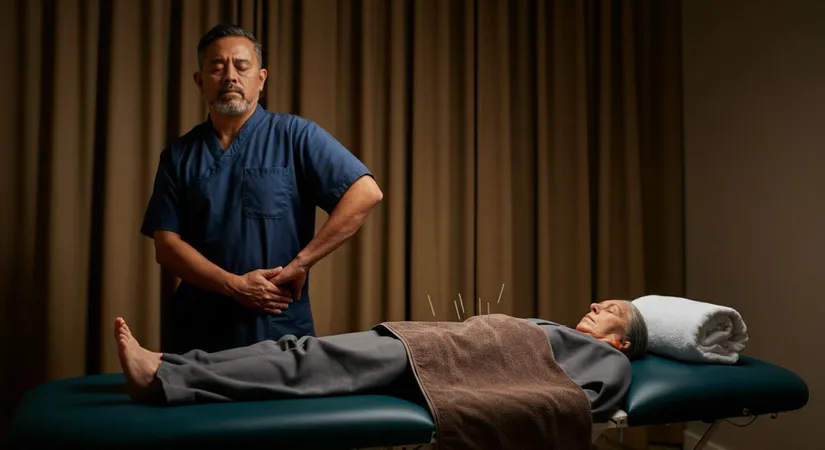What is Acupuncture: Exploring the Path to Holistic Healing
Explore acupuncture's journey from ancient Chinese medicine to modern-day wellness. Learn the benefits and science behind this healing therapy.
Acupuncture, a cornerstone of traditional Chinese medicine, has been a valued practice for over 3,500 years. This holistic healing method aims to balance the body's energy by stimulating specific points on the skin. But what exactly is acupuncture, and how does it work to promote health and wellness? This article explores the fundamentals of acupuncture, the science behind this ancient practice, and its myriad benefits for mental and physical well-being. Discover how acupuncture integrates into modern wellness routines, offering a path to enhanced vitality and health in today's fast-paced world.
Understanding the Basics: What is Acupuncture?
The Core Principles of Acupuncture
Acupuncture, a key component of traditional Chinese medicine, emphasizes the balance of 'qi' or 'chi', the body's life force. This practice involves over 1,100 acupuncture points, which are targeted to correct energy imbalances causing illness or discomfort.
By inserting thin needles into the skin at these points, acupuncture aims to stimulate the body's natural healing abilities. This process is believed to restore energy balance, enhance bodily functions, and promote overall wellness.
Key Benefits of Acupuncture
- Improves energy flow, potentially alleviating chronic pain.
- Supports mental health by reducing symptoms of anxiety and stress.
- Enhances holistic healing, integrating with other alternative medicine practices.
How Acupuncture Works: A Step-by-Step Guide
- Initial Assessment: Practitioners evaluate the patient's health and energy flow.
- Needle Insertion: Thin needles are strategically placed at specific acupuncture points.
- Energy Stimulation: Needles stimulate the body's healing response, aiming to restore balance.

How Does Acupuncture Work: The Science Behind the Practice
Scientific Insights into Acupuncture's Mechanisms
Acupuncture operates on the principle that stimulating specific points on the body can restore balance to the natural energy flow. Modern science explains this through various theories. For instance, acupuncture may trigger the release of endorphins, the body's natural painkillers, and enhance blood flow. The practice is said to have a regulatory effect on the nervous system, potentially altering brain chemistry by changing the release of neurotransmitters and neurohormones. This interaction is thought to help alleviate symptoms such as pain, improve sleep, and reduce stress.
The Role of Acupuncture in Modern Medicine
- Acupuncture is increasingly integrated into conventional healthcare for pain management.
- Research supports its use in reducing chronic pain and improving quality of life.
- Studies indicate potential benefits for mental health, including anxiety and depression relief.
- Initial Consultation: Patients discuss symptoms and health history with practitioners.
- Customized Treatment Plan: Practitioners develop a tailored approach based on individual needs.
- Ongoing Evaluation: Regular assessments ensure the therapy's effectiveness and necessary adjustments.

Acupuncture Benefits: Enhancing Well-being Naturally
Physical and Psychological Advantages of Acupuncture
Acupuncture offers a range of physical benefits, notably in pain management. It is effective in alleviating chronic pain, such as back pain and osteoarthritis, by targeting specific points to reduce inflammation and improve circulation. For instance, a study found that acupuncture significantly reduced chronic back pain in 60% of participants, showcasing its potential as a non-invasive treatment option.
Psychologically, acupuncture is renowned for its ability to reduce stress and anxiety. By stimulating the body's natural relaxation response, it helps balance the nervous system, promoting a sense of calm. This is particularly beneficial for individuals experiencing high stress levels, as acupuncture sessions can lead to a noticeable decrease in anxiety symptoms.
Holistic Healing Through Acupuncture
- Enhances sleep quality by regulating the body's internal clock and reducing insomnia.
- Improves digestive health, addressing issues like irritable bowel syndrome and bloating.
- Supports mental clarity and focus, aiding in overall cognitive function.
- Initial Assessment: Evaluate the patient's physical and mental health needs.
- Customized Treatment: Develop a plan targeting specific symptoms and conditions.
- Regular Sessions: Monitor progress and adjust treatments for optimal results.
Acupuncture Therapy: A Comprehensive Guide to Treatment Options
Exploring Diverse Acupuncture Techniques
Acupuncture therapy encompasses a variety of techniques, each designed to cater to specific health needs. Traditional acupuncture involves inserting needles at precise points to balance the body's energy. However, other methods like moxibustion and cupping are also integral to this practice.
Moxibustion involves burning a herb called mugwort near the skin to warm and invigorate the flow of Qi. This technique is particularly beneficial for conditions like arthritis and digestive disorders. Cupping, on the other hand, uses suction cups to stimulate blood flow and relieve muscle tension, often used for back pain relief.
Benefits of Acupuncture Techniques
- Traditional acupuncture can enhance fertility by improving blood flow to reproductive organs.
- Moxibustion is effective in boosting the immune system, aiding in recovery from colds.
- Cupping therapy helps in detoxifying the body, promoting overall wellness.
Steps in Acupuncture Therapy
- Consultation: Discuss health concerns and goals with the practitioner.
- Technique Selection: Choose the appropriate acupuncture method based on individual needs.
- Therapy Session: Undergo the selected treatment to address specific health issues.
Embracing Seasonal and Local Applications of Acupuncture
Adapting Acupuncture for Seasonal Health
Acupuncture is a versatile therapy that can be customized to address seasonal health challenges. For instance, during spring, many individuals suffer from allergies. Acupuncture can help alleviate symptoms such as sneezing and congestion by targeting specific points that boost the immune system and reduce inflammation.
In winter, when energy levels often drop, acupuncture can be used to enhance vitality and strengthen the immune system. This is particularly beneficial for preventing common colds and flu. By focusing on energy-boosting points, acupuncture helps maintain wellness throughout the colder months.
Finding Local Acupuncture Practitioners
- Seek practitioners who understand regional health concerns and cultural practices.
- Choose clinics with a strong reputation for personalized care and expertise.
- Ensure practitioners are certified and experienced in traditional Chinese medicine.
- Research local clinics and read reviews to find the best fit.
- Schedule consultations to discuss specific health needs and seasonal concerns.
- Commit to regular sessions to maximize the benefits of acupuncture therapy.
Integrating Acupuncture Into Modern Wellness Routines
Acupuncture's Role in Holistic Health Practices
Acupuncture seamlessly integrates into modern wellness routines, complementing practices like yoga and meditation. This synergy enhances mindfulness and holistic health, promoting a balanced lifestyle. For instance, acupuncture can enhance the meditative state by calming the mind and reducing stress.
Incorporating acupuncture into wellness routines supports self-care and the body's natural healing processes. It encourages individuals to listen to their bodies, fostering resilience against the stresses of contemporary living. This approach aligns with the growing trend towards holistic health, where physical and emotional well-being are interconnected.
Steps to Incorporate Acupuncture into Your Routine
- Identify personal wellness goals and how acupuncture can support them.
- Consult with a certified acupuncturist to develop a tailored plan.
- Integrate regular acupuncture sessions with other wellness practices.
Key Benefits of Acupuncture in Modern Wellness
- Enhances emotional balance, reducing anxiety and stress levels.
- Supports physical health by alleviating chronic pain and improving energy flow.
- Promotes a holistic approach to health, integrating mind and body wellness.
Integrating Acupuncture into Modern Wellness Routines
Enhancing Well-being Naturally Through Acupuncture
Frequently Asked Questions
What is acupuncture and how does it work?
What are the benefits of acupuncture for mental health?
How is acupuncture integrated into modern wellness routines?
What are the different techniques used in acupuncture therapy?
Can acupuncture help with back pain relief?
Discover the Path to 'Healthy Beauty' with estethica's Expert Care. Call Now for Your Free Consultation!
📞 Speak with Our Specialists Today!